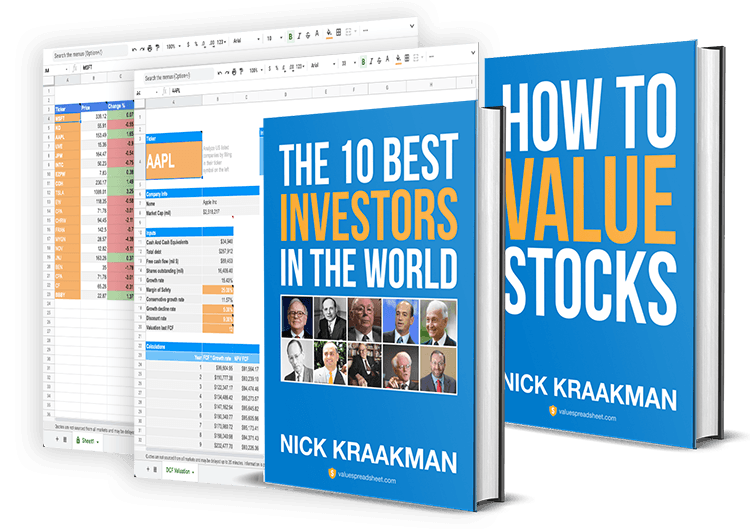Transcript
Hello guys, welcome back to the Value Investing Bootcamp podcast.
I'm your host Nick Kraakman.
This limited edition podcast series, for the people who are just tuning in for the first time, is to accompany my Value Investing Video course, which contains all the things I know about value investing.
It is literally jam packed with information, and knowledge, and spreadsheets, ebooks, checklists, the whole lot.
So, you'll get everything you need to know about value investing in one package.
In this podcast series, I want to introduce many of these topics already, although they will be covered in more detail in the course.
In this episode, we will be talking about free cash flow, which is a very, very important, but often overlooked metric, so we will go into detail in this episode.
So, first of all, what is free cash flow?
Well, a company generates cash by just running its business, which is called cash from operations.
You can find it on the cash flow statement.
That's one of the financial statements we discussed in an earlier episode.
So, on the cash flow statements you see one thing which is the cash from operating activities or cash from operations, and that is the amount of cash that a company actually generated from just running its business.
However, that is not the cash that actually can be given to shareholders, because the company will also have to pay for some of its-- Yeah, it has some cost to keep in business, you know, this is called Capital Expenditures, which is often also called Property, Plant & Equipment.
It has to pay for its machines, it has to pay its rent, its electricity bill, you know, just to stay in business.
This is the easiest way to calculate free cash flow; it is by taking the cash from operations and then subtracting the capital expenditures.
What you are left with is the so called free cash flow or the cash that can be actually taken out of the business and potentially given to shareholders while the business will still be able to keep on running.
So, that's the free cash flow.
And this is a very important metric to value investors, because the discounted cash flow model, which is an often used model to actually calculate the value of a company, requires this free cash flow number as an input.
So, it is important to be able to calculate it.
There is a more complicated way.
We just said cash flow operations minus capital expenditures.
There is a more complicated way, which gives you a more accurate estimate of their free cash flow.
It has to do with amortization, depreciation and working capital, but for now, let's just stick to the simple version.
It is important to remember though, that if free cash flow of a company is negative, this does not necessarily mean the company is not doing well, because it could also mean that a company is simply investing a lot of money back into the business, which, if these investments pay off, could lead to much more cash being generated, so it's not necessarily bad.
However, if a company consistently reports negative cash flow while still reporting increased earnings, you have to be very careful, because then this could indicate that something is wrong, because this is unsustainable.
I mean there is a big difference between earnings, reported earnings, and free cash flow.
Reported earnings are an accounting measure, an accounting metric, and they can be tinkered with fairly easily, so it can be manipulated up or down.
So, net earnings do not always really represent the profitability of a company correctly.
Cash cannot be as easily manipulated, so free cash flow often gives a more accurate measure of the actual money a company is making.
So, a company can report, for example, if we take Enron, which is a big example of a company which manipulated its earnings, if we look at the period before it collapsed, we can see that it reported increased earnings every single year, but it had a negative free cash flow for those years.
It just shows that it wasn't making any money, but it did report net earnings.
So, always be very careful when you when you see something like this, because preferably you are looking for a company that consistently reports higher free cash flow than it's reported earnings.
In that case, you can be fairly certain that this company is actually generating a lot of cash and is doing a very good job, and it's sustainable, and its earnings are probably not manipulated in that case.
Also, always check what a company is spending its cash on.
It could be using it to invest it back into its business, it could be using it to buy back shares or pay out dividends.
It’s important, because if it's only spending this money on maintaining its business, if it has hardly any cash left at the end, it's probably not such a profitable business and you might be better off looking for a better opportunity, a more profitable business.
On the balance sheet, you can look at how much cash reserves a company has.
It's also interesting to look at this number, and especially over the years, look at it over the past three to five years, and see if they are growing that cash reserves or burning through that cash reserve.
This can tell you a lot about what a company is doing, if it's actually generating a surplus of money and therefore growing its cash base, or if it's burning through its money and not enough cash is coming in.
You preferably, of course, look for companies that are generating so much cash that they don't know what to do with it anymore.
I hope all of this is clear to you.
If not, if you have questions about this or if you have suggestions for future episodes of this podcast, just shoot me an email at
You can also send me a tweet @ValueSheet.
I will also be checking that and answering all of your questions.
So, feel free to let me know what you think about the show or if you have questions.
Like I said, I would also greatly appreciate it if you guys could leave a review on iTunes, because this would make it possible for more people to find out about the show and improve their investment decisions.
Also, if you have people you know that might be interested in this show, yeah, point them to it.
Feel free to share it with everyone and spread the love.
I'll see you in the next episode.
If you enjoyed today's show, head over to ValueInvestingBootcamp.com to find out more on how you can invest like the pros, manage your own portfolio with confidence, and consistently earn mind boggling returns on the stock market.



